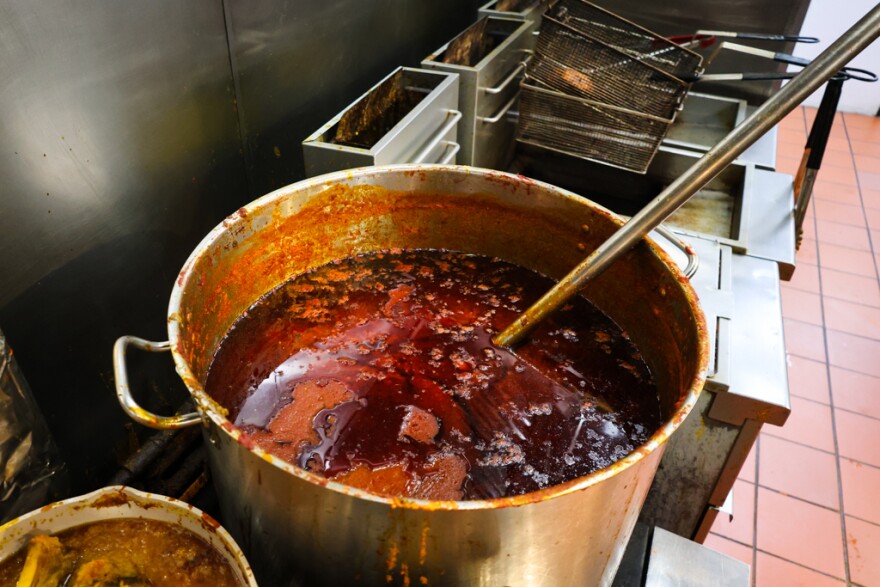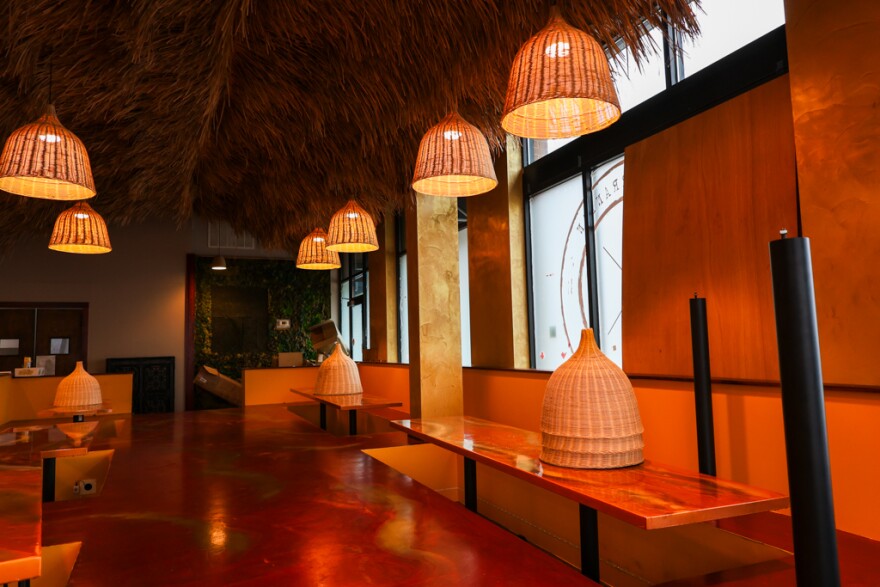For Chef Prej Iroegbu, Detroit is home base for both his family and his business: a series of well-loved food trucks called Fork in Nigeria. But his culinary talent was born and nurtured in Nigeria.
“I grew up in a family of seven. We were poor, but we had what we needed. So it wasn't like we were, like, hungry, because the farm was there.” Iroegbu said. “I just didn't like farming… I hated it.”
Instead of joining his family in working on the farm, Iroegbu convinced them to let him stay home and prepare a hot meal for them to enjoy when they returned from work.
“So I started coming up with different ideas to just keep myself from not going to the farm,” Iroegbu said. “So this business, this idea of being a chef came from not wanting to actually do the hard labor.”
Yet, he’s putting in quite a bit of labor to bring this idea to life.

A unique culinary education
Iroegbu’s family farm in Nigeria grew melons, yams, pineapple, and cocoa. They also raised livestock, but never slaughtered animals for their own consumption. As a result, all of Iroegbu’s cooking was fruit and vegetable-based.
“I didn't even know what a vegan was until I came to the U.S.,” Iroegbu said. “I realized, that's vegan. That's just normal, how we eat…”
Irogebu would often sell the leftovers from his family meal at a street stand. Just a teenager at the time, his reputation as a decent cook grew in the community. The word reached the workers at a nearby oil rig. Chefs from all over the world would be hired onto the ship’s culinary team to prepare staff meals.
“But one day these guys kept saying, ‘We want some African food. We want to try the local food,’” Iroegbu said. “So they came asking like, ‘Who in this area knows, really, how to cook?’ And everybody's like, ‘That kid, that kid, that kid.’”
That kid joined the rig’s culinary team and spent about a year learning how the kitchen operated. Then, still a teenager, Iroegbu was given a night to take the lead in preparing a meal.
“Every single person, every single worker in there ate all the food that I made,” Iroegbu said. “People came back looking for more… So they're like, ‘We're going to get you two times a week, three times a week.’ And then they eventually got me my own team. And it was one of the best times I ever had.”
He soon left Nigeria and eventually landed in Detroit, where he studied at Wayne State University. Food remained his passion, but when he struggled to find authentic Nigerian food in American restaurants, he set out to share his own cooking.
“I've traveled all around the country and I'm always going to get food. And I didn't like the way they quite made it,” Iroegbu said. “So I decided it would be time for me to really invest into the market and find out how I can make it work.”
Acquiring the right ingredients
The Fork in Nigeria menu offers savory meat dishes made with goat, lamb or oxtail, and equally hearty but less heavy veggie-based dishes, like cassava leaf stew and spinach and kale soup.

“Americans cook with, like, wine. In Nigeria, we cook with vegetables. So we simmer our meats with vegetables,” Iroegbu said as he simmered a cut of lamb in sauce seasoned with thyme, rosemary, and various peppers.
Many of his ingredients, Irogebu said, are sourced directly from Nigeria, including peppers, yams, and various spices. He also imports palm oil, a key ingredient in Nigerian cooking.
“When I first came in [to the industry], I realized a lot of the restaurants were substituting there for, like, vegetable oil,” Iroegbu said. “It's not the same… The texture is not the same, the flavor is not the same, the color is not the same.”
Iroegbu’s most popular dish incorporates egusi, another import that he said he struggled to find in the U.S. The ground melon seed is served in stew form with fufu, a white, flavorless ball of pounded yam.
Fork in Nigeria’s take on the dish had a moment in the spotlight on social media when a popular food influencer reviewed the meal on TikTok. Egusi stew with fufu is his most popular meal by far, Iroegbu said.
“The egusi and fufu is, about 48% of my sales,” he said. “So we make it vegan style. And then, you know, people want chicken, beef, goat, oxtail. They want red snapper, fish. And we can make that for them.”
Expanding the business
Iroegbu’s forthcoming restaurant, Calabash, is named after a type of gourd he would carry water in as a child. The Midtown brick-and-mortar will offer more Nigerian food options in a traditional family style setting where guests eat with their hands.
“When they come here, they are going to see there are no chairs here,” Iroegbu said. “They're going to remove their shoes, walk up there, and sit on the platform. We'll go up there, we’ll bring them a towel. They wash their hands, they're going to eat with their fingers, and it's going to be a family style feast.”

The space only seats 30 to 40 people. Reservations will be required so that diners can place their orders beforehand. Iroegbu hopes the service structure will bring a slower dining experience that will allow customers to really appreciate the food, and try a wide variety of dishes.
“I have a lot of love from Michigan, not just Detroit,” Iroegbu said. “I can tell you, not to brag, but when I go to Flint or any of these places… we have the longest lines. So we have people that actually follow us and believe in what we do, that I don't believe I can get anywhere else.”

!["Since I came to this country, I've always wanted to do what I did back home," Chef Prej Iroegbu said. "I came here and I realized we didn't really have the food that I ate [in Nigeria]."](https://npr.brightspotcdn.com/dims4/default/5a72c12/2147483647/strip/true/crop/1024x631+0+26/resize/880x542!/quality/90/?url=http%3A%2F%2Fnpr-brightspot.s3.amazonaws.com%2Faa%2Fc5%2Fd30477d84b4f996a1553c3c3c0b4%2Fforkinnigeria-prejiroegbu-creditroniacabansag-09.jpg)



![“[Egusi] is hard to describe. It is so different. It's like on a buttery side, but it's not butter,” Iroegbu said. “And it has this milk-looking color when you look at it. But once you cook it with the palm oil, it comes out with a beautiful orange-yellowish color.”](https://npr.brightspotcdn.com/dims4/default/70ecd72/2147483647/strip/true/crop/1024x631+0+26/resize/880x542!/quality/90/?url=http%3A%2F%2Fnpr-brightspot.s3.amazonaws.com%2F58%2F37%2F1f9cfbea4f67b0bda3a46f991a15%2Fforkinnigeria-prejiroegbu-creditroniacabansag-11.jpg)



